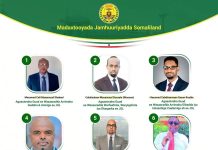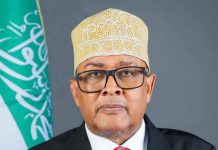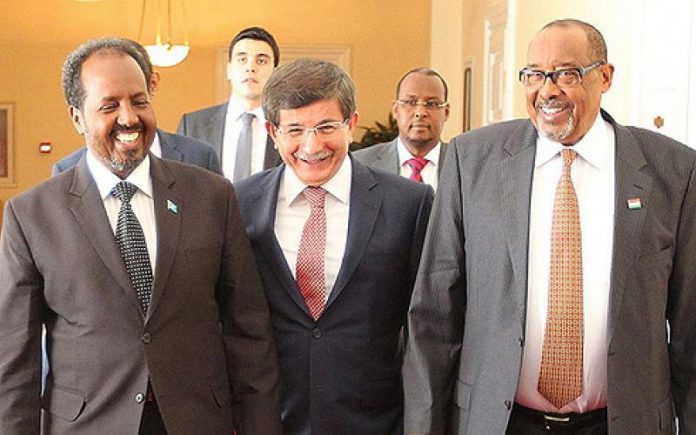WHAT IS INSIDE?
1.0 Overview
2.0 Background
3.0 Summary of the stages of the process:
4.0 Institutionalizing the talks
5.0 Multi-track approach
6.0 ISIR Recommendations
ISIR OBJECTIVES
Institute for strategic initiatives and
Research (ISIR) is an independent
not-for-profit think tank dedicated to
contribute building of democratic,
pluralistic societies and effective
public institutions in the Somali Horn
of Africa region through research and
Policy analysis.
http://www.isirthinktank.org
info@isirthinktank.org +252 (0) 634796383
LinkedIn URL Twitter handle
Institute for Strategic Initiatives and
Research (ISIR)
2
1.0 Overview
The Somalia-Somaliland talks have being in stalemate for more than four years since the last round
of talks held in Djibouti, December 2014, between former presidents Hassan Sh. Mohmoud and
Ahmed Silanyo. Now both parties have relatively new governments with neither of them taking bold
steps to return to the negotiating table. Several attempts were initiated to pressure both sides by the
international community to resume the talks and have even gone further to facilitate direct
communication channels between the two presidents through back door diplomacy, however none
of these is yet to be materialized as it has faced series of setbacks most notably in 2018, when the
federal government refuted both the military base and DP World’s concession agreement between
Somaliland and the United Arab Emirates resulting in Somaliland to suspend any prospect of renewing
the dialogue and throwing tirades of populist like rants thus delaying another window of opportunity
to reconcile differences.
The challenges facing the talks are not confined to the latest policy differences between the two
administrations, since the start of the talks both sides lacked consistency and purpose, preparations
were equally poor with different faces participating the process. Both parties were interested in
dragging on the process and preferred on discussions of less meaningful factors having firmly ignored
the main issues of difference, the union versus cessation tunes were raised in both Mogadishu and
Hargeisa with none of them suggesting to compromise their positions. The process also did not attract
the attention of regional and international organizations like IGAD, African Union, Arab league and
the United Nations in contrast to the roles they have taken in the past similar cases, like the North and
South Sudan peace talks.
The Institute for Strategic Initiatives and Research (ISIR) calls for all concerned parties to renew their
commitment to the process of negotiations in good faith by adopting a new and coherent approach
with the view to reach a permanent comprehensive deal. The aim of this Policy Brief is to propose to
the parties a different approach from the previous round of talks and sheds light on the important role
that the International community can play by appointing a chief mediator for a host country and a
core body consisting of countries at the forefront__ known as Somali friends and concludes with
several recommendations essential for reviving the diplomatic negotiation between the Federal
Government of Somalia and Somaliland Government.
2.0 Background
Republic of Somaliland declared its independence from Somalia in 1991, though it remains
unrecognized by the international community, Somaliland claims its legitimacy date back to the 1960
unitary government known as the Somali Republic that consisted of the unification of the two
territories of Italian Somaliland and British Somaliland. While the Federal Government of Somalia
considers the unilateral secession of Somaliland unbinding, Somaliland has a functioning government,
national army, currency, elected president and parliament and has presence in most of its territories,
thus fulfilling the legal requirements for statehood though we understand recognition is mostly
dependent on a political settlement with the mother state
Evidence-based research, Informed Public Debates & Independent Policy Analysis
Since its unilateral declaration of independence from the rest of Somalia, the government of
Somaliland adopted a policy of disengagement with Somalia, in a move to embolden its international
image as a separate entity from the rest of Somalia. Several attempts were made to involve
Somaliland into the Somalia peace conferences of which all but one convinced Somaliland
government to attend. At the time Somaliland cited power vacuum in Mogadishu and the absence
of legitimate government to negotiate with. The emergence of the late Abdullahi Yusuf Ahmed, a
former president of the state of Puntland, to head the transitional federal government of Somalia,
also stalled any prospect of dialogue between the two governments following the role Mr. Yusuf had
in instigating the Puntland-Somaliland border disputes.
Somalia-Somaliland talks officially begun after the London Conference on Somalia, held at Lancaster
House on February 23, 2012 which marked the first high level conference organized for Somalis since
1991. The communique called for the International community to support any dialogue between the
parties was welcomed by both Somaliland government and the Transitional federal government of
Somalia at the time and begun talks in goodwill. Most of Somali affairs’ analysts hailed the initiative
as a step toward the right direction to achieve lasting peaceful settlement of the Somalia-Somaliland
stalemate. Seven rounds of talks followed the period between 2012-2015 in London, Dubai, Ankara
and Djibouti with Turkey hosting the better part having assumed the role of facilitator and official host
of the dialogue.
Talks begun rather easy but at a swift pace, both sides created a political atmosphere conducive to
sustain the talks initially with both parties agreeing to ease travel restrictions between the two people,
both parties agreed to facilitate and encourage international Aid and Development to Somaliland
as well as cooperation on a number of security sectors related to intelligence and trainings i.e.
terrorism, piracy and co-manage the control of Somali Air space. the first round of talks would be
considered as only a dialogue to break decades long deadlock of disengagement though both sides
rushed to more concrete discussions albeit little preparations. This inspired a sense of optimism, Somalis
from both sides of the isle welcomed with a sense of Euphoria; in this regard, Somalia-Somaliland
dialogue initiated by the international community should be assessed as the first phase of the talks
i.e. Engage Somalis within themselves and should be commended.
Things soon got worse on two apparent issues; Somali air traffic control relocation from Kenya to
Somalia on whether it should be in Hargeisa or Mogadishu and engaging unionists hailing from
Somaliland by Mogadishu as part of its negotiators with the Somaliland delegation raising conditions
before the talks start and demanding their ejection before any sort of negations begin. The Federal
Government team rejected outright those preconditions and eventually prompted the Somaliland
delegations leave the talks and return to Hargeisa. The question of who represents parties to the
negotiation become major stumbling block that has not yet being resolved, there were also other
issues i.e. lack of agreement on implementations claimed by Somaliland in regard to the
management of Somali Airspace, with many analysts citing this as the primary reason why Somaliland
government walked away from the negotiation table, on the other side, president Hassan Sheikh
Mahmoud of Somalia was facing a mounting pressure from some of the parliamentarians questioning
the soft stance his administration is handling the process and the sympathy he has extended to the
Somaliland delegation which in turn forced him to appeal to his electorate , this led to the federal
government not prioritizing the dialogue by then it was evident the talks were failing and the public
support soon waned.
4
3.0 Summary of the stages of the process:
Somalia and Somaliland delegations first met in London, United Kingdom at the Chevening House in
June 2012 to set out framework for the dialogue, the process kicked off with the first face to face
meeting between the two presidents Mr. Ahmed Silanyo and Sharif Sheikh Ahmed in Dubai June 28,
2012, followed by three rounds of negotiations in Istanbul and Ankara, Turkey between 2013 and 2014
before the process stalled. Follow up efforts led to the Djibouti meeting in December 21, 2014
between president Silanyo of Somaliland and Hassan Sheikh Mohamoud of Federal Government of
Somalia; where, though both sides reiterated their commitment to re-start the talks, no talks have ever
been succeeded to fruition.
With Presidents Farmajo and Bihi coming to power in February and December 2017 respectively, both
have shown little signs of commitment to restart the process. More than four years have passed
without face to face meeting between the two sides, means less cooperation on all the issues agreed
but also the risk of renewed hostiles becomes in evitable, a scenario we all want to avoid. The claim
of Somaliland that the Federal Government of Somalia does not have presence on the land and
Mogadishu’s assertion that it enjoys United Nations’ legitimacy only makes the matters worse and
needs both sides to reconsider their approach.
A Mediator’s role: lessons learned from previous talks
During the last seven rounds of negotiations, the role of the international community in supporting the
dialogue was only limited to the facilitation and expected the Somalis to come up with agreed action
points. As the negotiations were getting close to the more advanced discussions both parties started
to look hesitant on the implementations and continuation of the process with no one exerting pressure
and direction, the process gradually slowed down and eventually led to the current impasse.
The cases of the two Sudanese, Angola, Indonesia, and Colombia in particular, present the
importance of a third party. After many years of armed conflict and disagreements, the international
community stepped up with mediation effort which led to the successful resolution of their
disagreements peacefully; hence, the Somalia-Somaliland case is no different. The Institute for
Strategic Initiatives and Research proposes a holistic mediation approach which brings on board all
countries dubbed as Friends of Somali political and peace affairs i.e. United Kingdom, United states,
Turkey, Norway, regional organizations like the IGAD, African Union, Arab League, Organization of
Islamic Union, the EU and the United nations to pool resources, establish a secretariat and nominate
a chief negotiator with credible experience who oversees the process and assures both parties.
Inclusion of the relevant actors will also enhance the probability that the negotiated outcomes will
be implemented thus undermining the prospect of a spoiler emerging.
The Institute also understands the potential risk which the shifting geopolitical balances unfolding in
the horn of Africa and Middle East poses to the neg
5
between the parties. Coordination between the various third parties is essential to elude a waste of
resources or even doing harm. “Groups of friends” involved in a process, as well as other ways of
keeping each other informed, is therefore essential
The Case of South Sudan
The case of the two Sudanese is relevant to the Somalia-Somaliland than many other International
led talks in the sense that both countries are IGAD member states, the Somali National Movement
which paved the way for the present day Somaliland has gone through armed struggle just the same
way as the SPLA/M and one party to the negotiation is seeking self-determination. For decades the
sides used to enter into negotiations but implementations failed constantly. The first formal talks were
held in Ethiopia (the Addis Ababa Talks, 1972) followed by the Koka Dam talks in the same country,
1986), the Sudan Peace Agreement in 1988, (the Jimmy Carter Nairobi Talks), Abuja I in 1992 and
Abuja II in 1993, as well as Barcelona I and Barcelona II. However, none has resulted in peaceful
resolution of their conflicts. It was alleged that many countries involved were in a competition as
Sudan is located in geostrategic location, the Oil resources, the Nile etc. therefore those parallel talks
were obvious from the beginning they will fail.
At some stage, both parties lost desire and purpose for any further negotiations, the late John Garang,
was once quoted as saying “regime in North Sudan” could not be reformed, that they were too
deformed to be reformed and must therefore be removed not improved. When we put into
perspective the current trend where both sides are not backing down, we may well brace for even
far worse scenario with the emergence of new political players in the region particularly the gulf crisis
and recent political developments in the Horn of Africa. The rapprochement between Ethiopia and
Eritrea, the coming to power of Prime Minister Abbey Ahmed and his aspirations for new political order
in the region which are not yet clear may present challenges or opportunities.
Thanks to IGAD mediation efforts led by Kenya, a new approach was adopted, president Moi
assigned General Sumeiywo to become the special Envoy who in turn asked all the stakeholder
countries to stand behind him, formed a secretariat and list of experts. The Special envoy provided a
framework for the Sudan peace process (1997-2005) that commanded the peaceful settlement of
conflict between the two Sudanese. The significant thing is the shift of John Garan from a strategy of
war and despair to a strategy of negotiation and hope is mainly due to successful mediation effort
that provided guidance, vision and follow up of agreement implementations__ because the
mediator serves as a link of communication between the parties and therefore helps parties to
explore meaningful options available for them before a deal is reached.
Time frame for Sudan peace process (1997-2005)
– Machakos Protocol (July 2002)
– Framework Agreement on Security Arrangements (September 2003)
– Agreement on Wealth-Sharing (January 2004)
– Protocol on Power-Sharing (May 2004)
– Three Areas Protocols (May 2004)
– Comprehensive Peace Agreement (January 2005)
6
4.0 Institutionalizing the process:
– The process of reaching lasting settlement between the two nations on self-determination
exerted by the government of Somaliland and protection of Somali Unity by the Federal
Government of Somalia will not be accomplished in an overnight; however, the negotiations
of this nature require a long-term process that will see current governments and incumbent
leaders go and others come and perhaps generations, as it may evolve this way. Both sides
need to take into account the need for in depth and thorough preparations which is well
documented.
– Another lesson learned will be to address the manner in which both parties entered into the
negotiations i.e. Wait and See mantra__ delegation members consisted of minsters, members
of parliament and party leaders who were selected on the bases of clan representations;
many had even no clue on items in the agenda. Faisal Ali Waraabe of UCID, was once quoted
as saying when he was asked about the delegation led by him, if there was any time spared
for the Somaliland team to brainstorm on the upcoming negotiations, he was told due to the
short time of notice given, they may discuss while on board on a plane to Turkey. Likewise, the
Federal Government delegation had even the similar scenario, though their negotiators would
come from different parts of the world before they join up their teams.
– It is noteworthy at later stages when the talks were stalled, Somaliland nominated an Envoy for
the talks, Somaliland needs to build on this and expand the Envoy’s role. Dr. Edna Aden is
credible and highly regarded figure in Somaliland, the Federal Government should also follow
suit and put in places persons with high caliber as negotiations require recognizable leaders.
– Another challenge that faced the parties to the Somalia-Somaliland talks was the in ability of
both sides to enter into skillful negotiations
– Against this backdrop the Institute for Strategic Initiatives and Research calls for the formation
of National Commissions with the mandate to negotiate on behalf of Somaliland and Somalia.
The commissions will undertake the role of negotiations secretariat for their respective
governments and will aid the leading government ministries with the necessary
documentations. The process of negotiations will involve learning negotiation techniques
through a series of Seminar style capacity building initiatives while the universities emphasize
on longer term academic development in the fields of peace building and conflict resolutions.
ISIR suggests the National Negotiation Commissions (NNC) to conduct regular workshops
across the country, as this in turn will enable the negotiators to learn modern diplomatic
negotiations skills, context-analysis, as well as negotiation strategies. For the commissions to be
effective constituent representation has to be addressed as this is critical to their mandate
though the final say rests with the political leadership of both sides.
5.0 The Multi Track Approach:
Another scenario to resuscitate the Somalia-Somaliland talks sustainably and achieve a lasting
solution to this saga is to involve local actors from the Civil Society, Intellectuals, University Peace
Institutes, Religion and Cultural figures as well as Business Leaders. This will help generate grass root
debate, discussions and understanding between the two people and would let Somalis to own the
talks. The process of involving a number of different actors is called multi-track approach, this model
advocates for the participation of local third parties in all levels of society in addition to diplomats.
The question relating to cessation or unification requires peaceful resolve regardless of the challenges
7
and determination of the two parties__ in this way both sides will provide various nonviolent and
mutually agreeable scenarios to settle the disagreements.
The inclusion of non-state actors in the process will provide reassurance to the main negotiating
parties as they’d give back-channel-communications to break any potential deadlocks and to exert
pressure on their respective government if one side fails to implement the agreements. The other
positive contribution of non-state actors could be the importance to bring different groups’ concerns
into the negotiation table so that the final deal involves all stakeholders because the more an
agreement reflects and is based on local knowledge and perspectives the more any future
agreement will be held permanently.
6.0 Recommendations:
1. Both the Federal Government of Somalia and Somaliland must come out of the shadows and
return to the negotiations table (Direct negotiations) without buying more time and neither
side making preconditions. The two sides must vehemently understand the shifting geopolitical
balances in the region and come up with well versed, critically analyzed and thoroughly
studied agendas.
2. To achieve a measurably full-fledged talks between the two parties, countries participating in
this process should adopt a harmonized and coherent approach in order to prevent the risk of
parallel talks
3. ISIR suggests both Somalia and Somaliland governments to institutionalize the process, assign
specific budgets aside and agree on a framework that will constitute the basis for the
negotiations.
4. Countries that are at the forefront of Somali political sphere must work on a common strategic
goal for Somalia-Somaliland relations and get behind one chief mediator while the rest pool
their resources in terms of funds and expertise. The mediation on the other side could be an
obstacle to the process in the presence of spoilers i.e. countries with competing interests.
5. The role of non-state actors is crucial; both governments are accountable to their populations;
holding open forums to discuss ideas, scenarios and best practices in the view point of
constructive dialogue and deepening the understanding of political leaders.


































